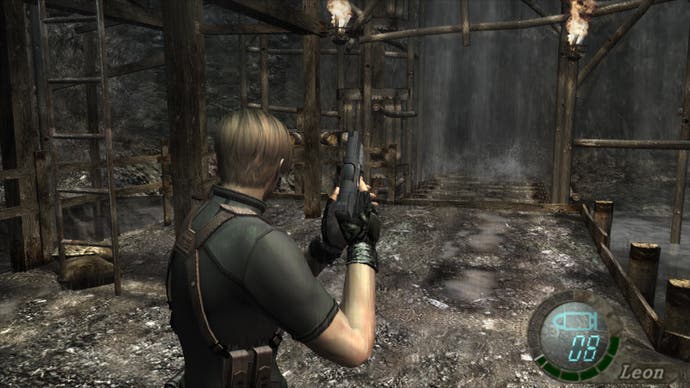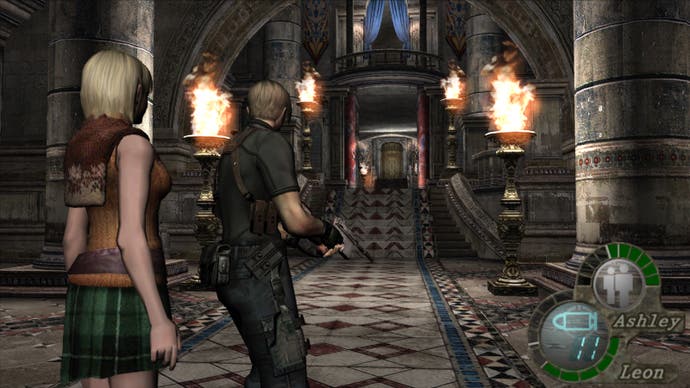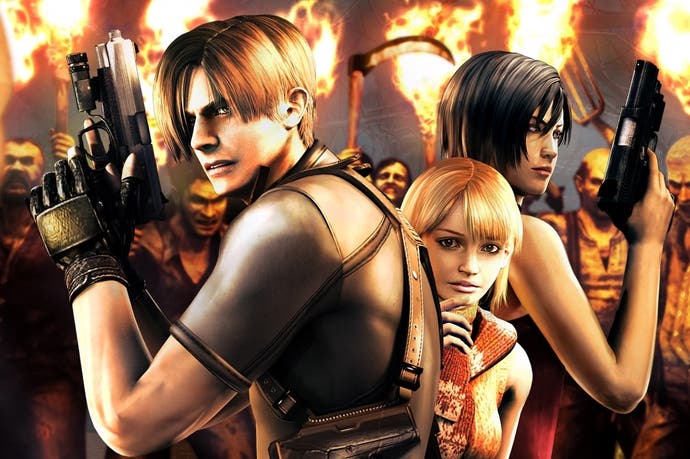Resident Evil 4 retrospective
The best of evil.
"He's not a zombie," says Leon S. Kennedy as he stands over the twitching corpse of the man he's knifed to death in a forest shack during Resident Evil 4's opening scene. Kennedy is as surprised as anyone: after cleaning up the zombie infested Racoon City in the second game in Capcom's survival horror series, any encounter with a person whose rotten flesh isn't slurping from the bones must be something of a novelty.
Indeed, Resident Evil 4's Los Ganados walk tall and never shuffle. They have bright, alert eyes instead of hollowed pupils, and in some cases wield chainsaws, not mere incisors. They speak in a quick European tongue rather than slurred moans and they maintain their humble houses rather than allowing them to fall to post-apocalyptic ruin. Los Ganados are, as the game's marketing slogan put it, a 'new kind of evil', peasant folk dressed in sackcloth and armed with rakes, hoes and sticks of dynamite. They're soiled with mud and the unmistakeable blemishes of land toil; even their chickens are grubby and irritable. They are a recognisable yet unfamiliar people, furious with intruders (they pin the police driver who escorts Kennedy to a post in the town square in the game's opening moments, where he hangs idly, burning) and calmed only by the rounded toll of a church bell. He's right. These are not zombies; they're something far worse.

Kennedy's surprise at this new kind of evil was, at the time of the game's release in 2005, mirrored in us. Players had grown weary with a series whose exquisitely pre-rendered backdrops now seemed antiquated, and whose fussy controls schemes seemed increasingly cheap. Indeed, Resident Evil 4 was, in its entirety, a new kind of Evil, a game designed from the peat up with such wisdom and creative insight that its example went on to define the subsequent decade of third person action video games.
The over-the-shoulder viewpoint was adopted by games as diverse as Gears of War and Batman: Arkham Asylum, while its precision aim system that snaps the camera inwards to focus on targets is now an industry standard. Where the previous games in the series had carefully placed monsters (whose shattering entrance through a pane of glass or the rear of a one-way mirror were lifted straight from low-rate horror cinema), Resident Evil 4 induces panic through a mob. The Ganados are defined by unpredictable, sporadic bursts of speed and lunging sidestep dodges. Kennedy must draw on his police officer training, not by way of a rapid response to cheap shot scares, but through crowd control. You must fire carefully placed shots to herd the Ganados and avoid being flanked. All the while you must preserve enough ammunition to cut a path through to the tenuous safety of Ramon Salazar's looming castle.
The exquisite set pieces and overarching systems (the way you must manage your suitcase of resources, chucking out the less useful items to make room for, say, a bulky high risk/ high reward rocket launcher) are initially obscured by the game's schlocky carapace. You play as an alpha male American hero sent in to rescue a VIP, and the script is B-movie nonsense. When the identity of the target is revealed to Kennedy as he's driven into the woods, his remote operator adds the warning: "She's the President's daughter: so try to behave yourself," as if a hostage of lower social standing would be well-suited for sexual advance. The other members of the cast are played with pantomime overstatement (the murmuring monks, the frenzied midgets) and frequently break the fourth wall ("I've sent you a copy of the game manual," says Kennedy's handler).
But a lack of narrative finesse is one of the few vestiges from the series' early days. You still record your progress on rusty typewriters (inexplicably left in random shacks and side-rooms) but the underlying game is entirely fresh. The shooting gallery minigame, which recurs over the course of the story's 20-hour sprawl with increasing complexity, reveals the design cornerstone on which the game has been founded. Here Kennedy stands, rooted to the spot, as various targets dip and strafe across his field of vision. It's an interactive rhythm replicated throughout the rest of the game, where the shooting gallery is transposed to a still lake or echo-y castle wing, dressed in different scenery yet always maintaining the exquisitely balanced core.
Played today, Resident Evil 4 can seem curiously prototypic; everything feels a little off when set against contemporary fashions. The buttons are in the 'wrong' place; the absence of a strafe can cause its own kind of panic as you sprint to put a few metres between you and your attacker before wheeling around to slow their advance. Aiming down the sights is slow and twitchy. But spend some time with the game and these begin to seem like deliberate impediments, designed to keep you alert and ever ready to respond to unexpected peril. Then there's the escalation: this is a game that rarely repeats itself, always raising the stakes, exploring new ways to exploit Kennedy's tools. It puts most contemporary blockbusters, which reveal their hand in the first act and then merely repeat the trick over and over, to grim shame.

Such a comprehensive overhaul was the result of tremendous toil. The first prototype morphed into Devil May Cry, while Capcom discarded three subsequent iterations, one of which was dropped almost midway to completion. Eventually series originator Shinji Mikami wrangled the game back on track, inspiring his harassed, no doubt disillusioned team to turn in some of Capcom's best work. The pressure on Mikami was immense: his bosses told him that they would cancel his series if this sequel underperformed. Then there was his personal ennui with a series that had stumbled into cliché, from the zombies all the way down to its roots.
Whatever the reason, Mikami's bold reinvention reinvigorated Resident Evil (if only for a moment) while inspiring a new generation of action adventure games. Most of these have failed to match Resident Evil 4's heights: the QTEs proved dull when transposed elsewhere, the hemmed in camera view only worked in wide open spaces and few other teams managed to conjure monsters of equal potency from their imagination. Then there are the post-game bonuses, the witty and terrifying subversions that reveal the care that has gone into arranging the game's multitudinous cogs. Prise these pieces apart and few game-makers have managed to rebuild Resident Evil 4. Its shadow is cast long across an industry still obsessed with bettering its example, yet still utterly confounded in realising this ambition









